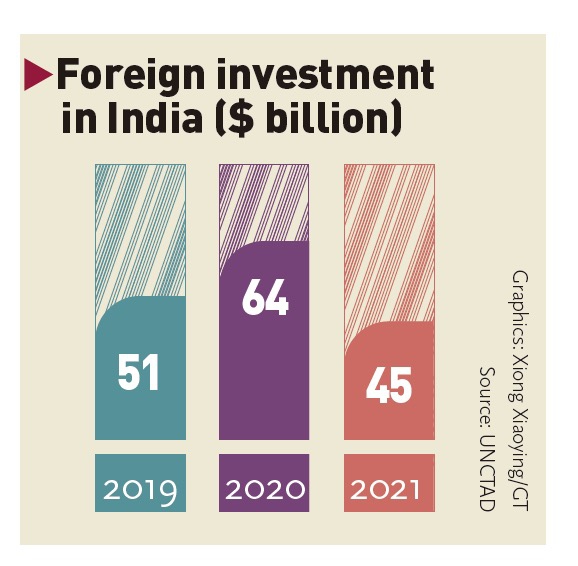
Smartphone components of Xiaomi Inc are loaded onto a plane at Shenzhen Bao'an International Airport, South China's Guangdong Province, heading to India's Chennai. This is a five-hour nonstop cargo route operated by domestic express delivery firm SF Express, which has opened international delivery services in 53 countries and regions. Photo: VCG
Chinese companies and businessmen are deeply concerned about the recent harsh treatment they received from Indian authorities, including week-long custody and unexpected scrutiny of their businesses, in what could be an unprecedented move targeting Chinese firms and individuals.
In responding to the visa expiry of some Chinese business people trapped in India due to COVID-19 pandemic, local Indian authorities launched a clampdown, which industry insiders said was conducted in a way that was intended to squeeze Chinese companies. More than 1,000 Chinese business people were allegedly mistreated.
Business representatives said that Indian moves will further damage its market environment and shake foreign business confidence in India.
Yang Shucheng, secretary general with the India China Mobile Phone Enterprise Association, told the Global Times on Monday that Indian move will have a serious impact on Chinese mobile phone makers there, particularly the small and medium-sized manufacturers and traders.
"Around 1,000 Chinese business people are troubled by the situation (in India) and about 100 have already come under scrutiny," Yang said, expressing his deep concern over what would happen to them next. "It's not only that these individuals may face one or two weeks in custody - their businesses will also be pressured," Yang said.
"We believe this is a targeted behavior, and is a continuation of India's purported crackdown on Chinese-funded companies, especially in the technology industry such as mobile phones," Yang added.
It is more about "ransacking" Chinese money, a Chinese executive based in India told the Global Times on condition of anonymity on Monday.
"The Indian government is playing a combo in the ransacking of Chinese companies this time…they have been rolling out laws and regulations and taking advantage of being the interpreter of such newly minted laws to crack down on law-abiding Chinese companies," the person said.
There are also discriminatory measures that are curbing Chinese investment, such as the banning of Chinese apps, the executive said.
"I know a Chinese businessman who invested tens of millions of yuan in a number of restaurants here. The man couldn't bear the thought of leaving his business behind unattended, so he remained in India after his visa expired. The Indian authorities detained him, and even charged him as a spy," the executive said.
The Indian government's relentless measures targeting foreign companies have led to a chain effect, which is partially reflected in the increasing number of foreign businesses that chose to withdraw from India.
In December last year, Commerce and Industry Minister Piyush Goyal told Parliament that 2,783 foreign companies with registered offices or subsidiaries in India had closed their operations in India between 2014 and November 2021. It was a high number, given that there were just 12,458 active foreign subsidiaries operating in India, according to Goyal, Indian media outlet Business Standard reported on May 26.
In May, the Indian government launched an investigation into Chinese companies ZTE and Vivo for alleged financial irregularities, another round of investigation by Indian government involving Chinese companies after earlier probes into companies such as Xiaomi.
China's Foreign Ministry spokesperson Zhao Lijian said in responding to the case that the Chinese government has always required Chinese companies to operate legally and compliantly overseas, while at the same time, firmly supporting Chinese companies in safeguarding their legitimate rights and interests.
The Indian side should act in compliance with laws and regulations, and provide a fair, just and non-discriminatory business environment for Chinese companies to invest and operate in India, Zhao said.

Graphics:GT
"The Indian government should not avoid things and be the 'ostrich in the desert'," Qian Feng, director of the research department at the National Strategy Institute at Tsinghua University, told the Global Times on Monday. The departing firms had expressed dissatisfaction with India's unfriendly business environment, which is why they chose to leave the Indian market.
"Although we have no intention to interfere with the domestic laws of India, we call on the Indian authorities not to abuse their powers of law enforcement and politicize issues related with business operation there," Qian said.
If India wants to become what Indian Prime Minister Narendra Modi said a developed economy by 2047 - it should take friendly measures toward foreign investment, Qian noted.





